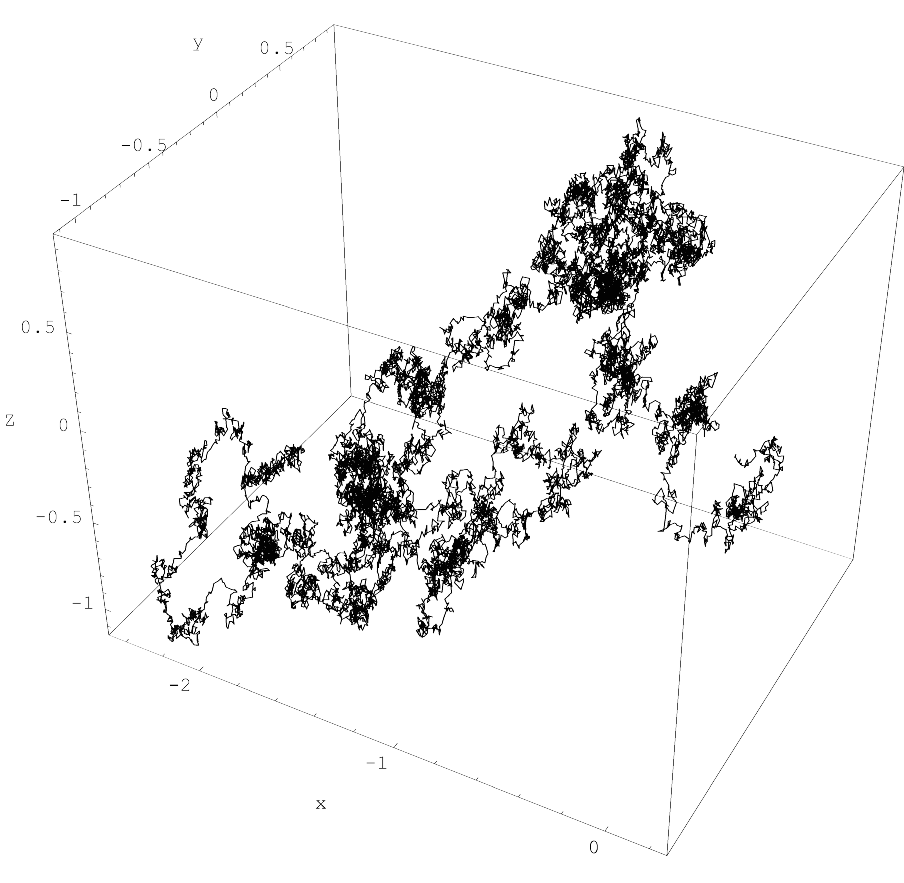Markov property on:
[Wikipedia]
[Google]
[Amazon]
 In
In
 In
In probability theory
Probability theory or probability calculus is the branch of mathematics concerned with probability. Although there are several different probability interpretations, probability theory treats the concept in a rigorous mathematical manner by expre ...
and statistics
Statistics (from German language, German: ', "description of a State (polity), state, a country") is the discipline that concerns the collection, organization, analysis, interpretation, and presentation of data. In applying statistics to a s ...
, the term Markov property refers to the memoryless
In probability and statistics, memorylessness is a property of probability distributions. It describes situations where previous failures or elapsed time does not affect future trials or further wait time. Only the geometric and exponential d ...
property of a stochastic process
In probability theory and related fields, a stochastic () or random process is a mathematical object usually defined as a family of random variables in a probability space, where the index of the family often has the interpretation of time. Sto ...
, which means that its future evolution is independent of its history. It is named after the Russia
Russia, or the Russian Federation, is a country spanning Eastern Europe and North Asia. It is the list of countries and dependencies by area, largest country in the world, and extends across Time in Russia, eleven time zones, sharing Borders ...
n mathematician
A mathematician is someone who uses an extensive knowledge of mathematics in their work, typically to solve mathematical problems. Mathematicians are concerned with numbers, data, quantity, mathematical structure, structure, space, Mathematica ...
Andrey Markov
Andrey Andreyevich Markov (14 June 1856 – 20 July 1922) was a Russian mathematician best known for his work on stochastic processes. A primary subject of his research later became known as the Markov chain. He was also a strong, close to mas ...
. The term strong Markov property is similar to the Markov property, except that the meaning of "present" is defined in terms of a random variable known as a stopping time.
The term Markov assumption is used to describe a model where the Markov property is assumed to hold, such as a hidden Markov model.
A Markov random field extends this property to two or more dimensions or to random variables defined for an interconnected network of items. An example of a model for such a field is the Ising model
The Ising model (or Lenz–Ising model), named after the physicists Ernst Ising and Wilhelm Lenz, is a mathematical models in physics, mathematical model of ferromagnetism in statistical mechanics. The model consists of discrete variables that r ...
.
A discrete-time stochastic process satisfying the Markov property is known as a Markov chain
In probability theory and statistics, a Markov chain or Markov process is a stochastic process describing a sequence of possible events in which the probability of each event depends only on the state attained in the previous event. Informally ...
.
Introduction
A stochastic process has the Markov property if theconditional probability distribution
In probability theory and statistics, the conditional probability distribution is a probability distribution that describes the probability of an outcome given the occurrence of a particular event. Given two jointly distributed random variables X ...
of future states of the process (conditional on both past and present values) depends only upon the present state; that is, given the present, the future does not depend on the past. A process with this property is said to be Markov or Markovian and known as a Markov process
In probability theory and statistics, a Markov chain or Markov process is a stochastic process describing a sequence of possible events in which the probability of each event depends only on the state attained in the previous event. Informally, ...
. Two famous classes of Markov process are the Markov chain
In probability theory and statistics, a Markov chain or Markov process is a stochastic process describing a sequence of possible events in which the probability of each event depends only on the state attained in the previous event. Informally ...
and Brownian motion.
Note that there is a subtle, often overlooked and very important point that is often missed in the plain English statement of the definition: the statespace of the process is constant through time. The conditional description involves a fixed "bandwidth". For example, without this restriction we could augment any process to one which includes the complete history from a given initial condition and it would be made to be Markovian. But the state space would be of increasing dimensionality over time and does not meet the definition.
History
Definition
Let be aprobability space
In probability theory, a probability space or a probability triple (\Omega, \mathcal, P) is a mathematical construct that provides a formal model of a random process or "experiment". For example, one can define a probability space which models ...
with a filtration
Filtration is a physical separation process that separates solid matter and fluid from a mixture using a ''filter medium'' that has a complex structure through which only the fluid can pass. Solid particles that cannot pass through the filte ...
, for some (totally ordered
In mathematics, a total order or linear order is a partial order in which any two elements are comparable. That is, a total order is a binary relation \leq on some set X, which satisfies the following for all a, b and c in X:
# a \leq a ( r ...
) index set ; and let be a measurable space. A -valued stochastic process adapted to the filtration is said to possess the ''Markov property'' if, for each and each with